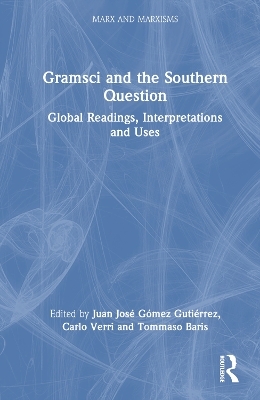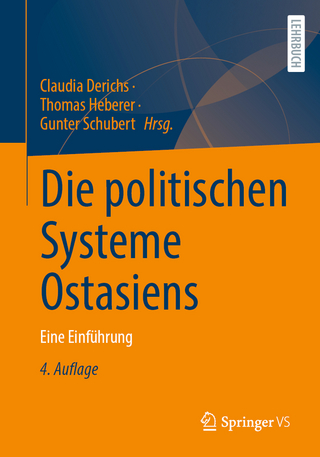
Gramsci and the Southern Question
Routledge (Verlag)
978-1-032-73386-9 (ISBN)
- Noch nicht erschienen (ca. Februar 2025)
- Versandkostenfrei innerhalb Deutschlands
- Auch auf Rechnung
- Verfügbarkeit in der Filiale vor Ort prüfen
- Artikel merken
This book looks at the Southern question in Antonio Gramsci. It takes this as an opportunity to reflect on the special nature of his thought, linked to the concepts of hegemony, subalternity and the critique of the particular cultural-identitarian and ideological forms of the South and its historical development.
Although the category was originally applied to the politics and history of Italy, the debates on the Southern question have in recent times gained wider relevance, combining with today’s more general analyses relating, for example, to European geopolitics, globalisation and the various global Souths, to media and mass culture, etc. In other areas, the Southern question in Gramsci has taken the form of a materialist epistemology, connected to the historical phenomenon of the splitting of consciousness, as opposed to its unity on a theoretical level. Elsewhere, it has become a programme for the application of a strategy of the international left, based on the building of alliances between different groups of subalterns. Over time, Gramsci's thought has come into contact with other partly converging perspectives, such as critical urban theory and cultural and subaltern studies.
This has given rise to numerous fruitful lines of research in which the Southern question has been extended from Italy’s own North-South divide to other contexts. What aspect of Gramsci’s thought could justify this issue taking on such importance? Gramsci and the Southern Question: Global Readings, Interpretations and Uses aims to answer this question by combining general theoretical approaches with studies on the reception of Gramscian concepts in the world’s Souths.
Juan José Gómez is lecturer of Aesthetics and Art Theory at the University of Seville. He studies the relationship between art and politics, in particular modern art. He is the author of The PCI Artists: antifascism and Communism in Italian Art: 1944-1951 (2015) and Urbanismo y contraurbanismo de la Revolución Industrial a la Ciudad Global (2020) and curator of Critica, tendencia y propaganda. Textos sobre arte y comunismo (1917-1954) (2004). He has also published various articles and coordinates several book series with volumes on modern art, philosophy and the history of music. Carlo Verri teaches contemporary history at the University of Palermo. He holds the national scientific qualification as a second-rank professor and is a member of the editorial board of Spagna contemporanea. He is a member of the scholarly committee of the Istituto Gramsci Siciliano and the Centro documentazione e ricerca Trentin-Iveser. He studies antifascism, the Resistance, World War I, the contemporary history of Sicily and Carlism. He has recently published Los carlistas en las Cortes constituyentes (1869-1971), PUZ, Zaragoza, 2023. Tommaso Baris is Associate Professor of Contemporary History at the University of Palermo, member of the Istituto Gramsci Siciliano and of the Fondazione Antonio Gramsci. He has studied Fascism and Republican Italy. His recent works include Andreotti una biografica politica, il Mulino, 2021 and “La Resistenza e la nascita della Repubblica”, in Il comunismo italiano nella storia del Novecento, Viella, 2021.
Introduction Part 1: The Southern Question in Gramsci Between History and Theory 1. The Southern Question in Gramsci, Between Salvemini and Lenin 2. Gramsci’s Southern Question Between Hegemony and Revolution in the West 3. Antonio Gramsci: The Southern Question, Americanism and “National Life” 4. Plan and Autonomy. The Southern Question from Gramsci to Italian operaismo Part 2: From the Southern Question to Subaltern Studies. Interdisciplinary Approaches 5. Postcolonial Gramsci? From the Southern Question to Postcolonial Studies 6. From the creative popular spirit to the subject of lack. Gramscian variations on subalternity and its sources 7. School and subalternity in the thought of Antonio Gramsci 8. Dialect, grammar and the antithetical function of the philosophy of praxis in the Prison Notebooks 9. Aesthetics and Popular Culture in Antonio Gramsci 10. Subalternity and Baroque Culture. A Gramscian reading of communication studies in the Global South 11. Southern Question and Subalternization. A Gramscian analysis of power asymmetries in the European Union Part 3: Some case studies: The “Southern Questione” in Europe, Arab World and Latin America 12. Gramsci's Southern Question in Spain 13. The “Southern Question” in Latin America: Receptions, Interpretations and Translations 14. Gobetti, Gramsci and Mariátegui, on the Southern Question José Luis Villacañas 15. Gramsci and the Arab New Lefts: Making Sense of the Early Translations 16. A Gramscian Analytical Perspective about the Arab countries: A Long Southern Question?
| Erscheint lt. Verlag | 11.2.2025 |
|---|---|
| Reihe/Serie | Marx and Marxisms |
| Verlagsort | London |
| Sprache | englisch |
| Maße | 152 x 229 mm |
| Themenwelt | Geisteswissenschaften ► Philosophie |
| Sozialwissenschaften ► Politik / Verwaltung ► Politische Systeme | |
| Sozialwissenschaften ► Politik / Verwaltung ► Politische Theorie | |
| ISBN-10 | 1-032-73386-1 / 1032733861 |
| ISBN-13 | 978-1-032-73386-9 / 9781032733869 |
| Zustand | Neuware |
| Haben Sie eine Frage zum Produkt? |
aus dem Bereich


